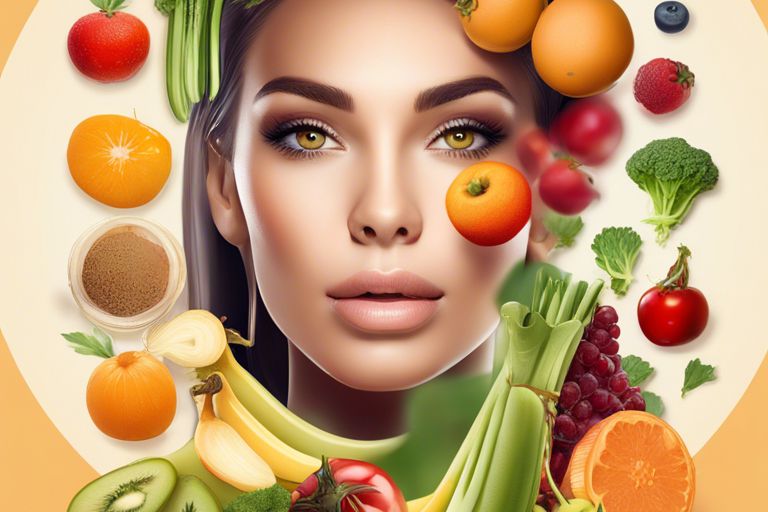Diet plays a crucial role in maintaining healthy skin. Our skin is the body’s largest organ and acts as a barrier against external threats. What we eat directly affects the health and appearance of our skin. Consuming a nutrient-dense diet can promote clear, glowing skin, while a poor diet high in sugar and processed foods can lead to various skin issues such as acne, inflammation, and premature aging. Understanding the impact of diet on skin health can empower us to make informed choices that support overall skin well-being.
Key Takeaways:
- Diet affects skin health: What you eat can have a direct impact on the health and appearance of your skin. A balanced diet rich in nutrients can promote clear, glowing skin.
- Antioxidant-rich foods are essential: Antioxidants help protect the skin from damage caused by free radicals. Foods like berries, nuts, and leafy greens are great sources of antioxidants that support skin health.
- Stay hydrated: Drinking plenty of water is crucial for maintaining skin hydration and overall health. Aim to drink at least 8 glasses of water a day to keep your skin looking and feeling its best.
The Science of Skin Physiology
Now, let’s research into the intricate world of skin physiology and how diet plays a crucial role in maintaining its health and vitality.
The Skin’s Complexity: A Cosmological Perspective
The skin can be likened to a vast universe of cells, each playing a unique role in protecting and supporting the overall health of the body. Just as the cosmos is a complex system of galaxies, stars, and planets, the skin is a sophisticated network of layers, glands, and cells working in harmony.
Understanding the skin’s physiology from a cosmological viewpoint allows us to appreciate its interconnectedness and the impact that internal and external factors, including diet, can have on its health and appearance.
Nutritional Astronomy: Feeding Our Cellular Universe
Feeding our cells with the right nutrients is akin to supplying energy to celestial bodies in space. Just as stars require elements to fuel their brilliance, our skin cells need essential vitamins, minerals, and antioxidants to function optimally and maintain a radiant complexion.
This cosmic perspective on nutrition underscores the significance of a well-balanced diet in nurturing our cellular universe, influencing everything from skin regeneration and repair to protecting against environmental aggressors.

Dietary Elements and Their Cosmic Influence on Skin
While we often focus on skincare products for improving our skin health, the impact of our diet on our skin should not be underestimated. The food we consume plays a crucial role in determining the quality and appearance of our skin. Understanding the cosmic influence of dietary elements can help us make informed choices for healthier skin.
The Stellar Role of Vitamins and Antioxidants
Role Vitamins and antioxidants are like cosmic superheroes for our skin. They help fight off free radicals that can damage skin cells and accelerate aging. Vitamin C, for example, boosts collagen production, while vitamin E protects against UV damage. Antioxidants such as beta-carotene and selenium help maintain skin elasticity and promote a youthful glow.
Vitamins and antioxidants act as a shield, protecting our skin from environmental aggressors and promoting overall skin health. Including a variety of fruits, vegetables, nuts, and seeds in your diet can provide your skin with the necessary cosmic nutrients it needs to thrive.
The Dark Matter of Unhealthy Fats and Processed Foods
Fats While vitamins and antioxidants shine brightly in the cosmic realm of skincare, unhealthy fats and processed foods lurk in the dark matter, ready to wreak havoc on our skin. Trans fats and high levels of sugar can contribute to inflammation, acne, and premature aging. Avoiding these culprits is crucial for maintaining clear, radiant skin.
This dark matter not only affects our skin’s appearance but can also impact its overall health and function. Consuming too much of these unhealthy fats and processed foods can disrupt the skin’s natural balance and lead to long-term damage. Opting for whole, unprocessed foods rich in essential fatty acids can help nourish your skin from within and keep it glowing.
Evolutionary Perspectives on Skin Health
For millions of years, human beings have evolved and adapted to their environments, including the foods available to them. Our ancestors relied on a diet of natural, whole foods that provided essential nutrients for optimal health, including skin health. Understanding the evolutionary perspectives on skin health can provide valuable insights into the impact of diet on our skin.
Adapting to Modern Diets: An Epigenetic Approach
An epigenetic approach to understanding the impact of diet on skin health considers how gene expression can be influenced by various dietary factors. Modern diets high in processed foods, sugar, and unhealthy fats can lead to changes in gene expression that negatively impact skin health. By looking at how our genes respond to the foods we eat, we can better understand the importance of returning to a more natural and nutrient-dense diet for optimal skin health.
Natural Selection of Nutrients: Survival of the Skinniest
Any discussion of evolutionary perspectives on skin health must consider the concept of natural selection and survival of the fittest. Throughout human evolution, nutrient-dense foods rich in vitamins, minerals, and antioxidants played a crucial role in supporting healthy skin. Our ancestors relied on a diverse diet of fruits, vegetables, lean meats, and nuts to nourish their skin from the inside out.
Selection of nutrient-dense foods was essential for our ancestors’ survival and played a significant role in shaping our genetic makeup and skin health today.

Practical Dietary Galaxies to Explore
Habitable Zones: Balancing Macronutrients for Optimal Skin Health
Unlike the vast universe, where habitable zones are few and far between, in the realm of diet, finding the right balance of macronutrients for your skin’s health is crucial. Macronutrients such as proteins, fats, and carbohydrates play a significant role in maintaining the skin’s structure, hydration, and overall health. Proteins are essential for collagen production, fats help maintain the skin’s barrier function, and carbohydrates provide energy for skin cell regeneration.
Practical tips for achieving the optimal balance include focusing on lean sources of protein like fish and chicken, incorporating healthy fats from sources like avocados and nuts, and prioritizing complex carbohydrates such as whole grains and fruits. By ensuring a well-rounded intake of macronutrients, you can pave the way for radiant and healthy skin.
Exotic Matter: The Role of Probiotics and Novel Foods
Probiotics and novel food ingredients can be considered exotic matter in the galaxy of skin health. Probiotics, known as the “good bacteria,” play a crucial role in gut health, which is intricately linked to skin health. Introducing probiotic-rich foods like yogurt, kefir, and sauerkraut into your diet can help promote a healthy balance of gut bacteria, leading to clearer and more vibrant skin.
For instance, foods like turmeric, matcha, and spirulina are gaining popularity for their antioxidant and anti-inflammatory properties, which can benefit the skin. Exploring these novel ingredients can add a cosmic boost to your skin’s health and overall well-being.
To wrap up
Hence, it is clear that diet plays a crucial role in maintaining the health and appearance of our skin. By consuming a balanced diet rich in nutrients, antioxidants, and hydration, we can support our skin’s natural functions and protect it from damage. Making small changes to our diet can lead to significant improvements in skin health, providing us with a glowing complexion and overall well-being.
FAQ
Q: What role does diet play in skin health?
A: Diet plays a crucial role in skin health. Consuming a balanced diet rich in vitamins, minerals, and antioxidants can help nourish the skin from within and promote a healthy complexion.
Q: How does water intake affect the skin?
A: Adequate water intake is essential for healthy skin. Water helps to hydrate the skin cells, flush out toxins, and maintain skin elasticity. Dehydration can lead to dryness, dullness, and potential skin issues.
Q: What are some foods that can promote skin health?
A: Foods rich in omega-3 fatty acids, such as salmon and walnuts, can help reduce inflammation and keep the skin hydrated. Additionally, fruits and vegetables high in antioxidants, like berries and spinach, can protect the skin from damage caused by free radicals.

